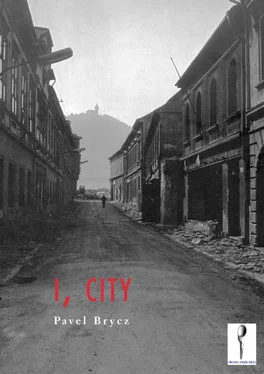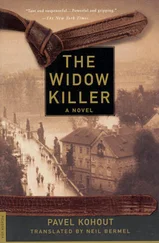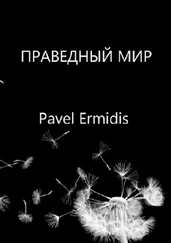Pavel Brycz - I, City
Здесь есть возможность читать онлайн «Pavel Brycz - I, City» весь текст электронной книги совершенно бесплатно (целиком полную версию без сокращений). В некоторых случаях можно слушать аудио, скачать через торрент в формате fb2 и присутствует краткое содержание. Год выпуска: 2006, Издательство: Twisted Spoon Press, Жанр: Современная проза, на английском языке. Описание произведения, (предисловие) а так же отзывы посетителей доступны на портале библиотеки ЛибКат.
- Название:I, City
- Автор:
- Издательство:Twisted Spoon Press
- Жанр:
- Год:2006
- ISBN:нет данных
- Рейтинг книги:5 / 5. Голосов: 1
-
Избранное:Добавить в избранное
- Отзывы:
-
Ваша оценка:
- 100
- 1
- 2
- 3
- 4
- 5
I, City: краткое содержание, описание и аннотация
Предлагаем к чтению аннотацию, описание, краткое содержание или предисловие (зависит от того, что написал сам автор книги «I, City»). Если вы не нашли необходимую информацию о книге — напишите в комментариях, мы постараемся отыскать её.
Dubliners
I, City
I, City — читать онлайн бесплатно полную книгу (весь текст) целиком
Ниже представлен текст книги, разбитый по страницам. Система сохранения места последней прочитанной страницы, позволяет с удобством читать онлайн бесплатно книгу «I, City», без необходимости каждый раз заново искать на чём Вы остановились. Поставьте закладку, и сможете в любой момент перейти на страницу, на которой закончили чтение.
Интервал:
Закладка:
I want to be their lost child on the boulevard of the Champs Elysées, who they take under their wing and lead home.
AN APPEARANCE, WINTRY
They were cold; they trudged through the mud with nowhere to go. So they went to the planetarium to look at the stars. They wanted to lie alongside one another, to look at the stars up above them; they wanted to get warm. But in the planetarium, the dazzling sky tore free, all the stars went off to the movies and he and she stood helpless in the lobby of the House of Culture. They were fifteen and didn’t know what to do next.
Then they had the idea to peek into a hall that was giving out an odd old music.
It was Ellington, performed by The Original Prague Syncopated Orchestra with Ondřej Havelka. The concert hall was packed. Laura and Her Tigers (all of them) and Most’s miners’ brass band were there, too.
The usherette seated Him in the only free seat on the left side of the hall and Her on the side opposite.
Ondřej Havelka was singing an Ellington blues:
Yesterday I fell asleep real bad,
and had myself this dark dream.
I was in New Orleans,
and I was a slave
with great white teeth
to ground great anger down.
Great white bales of cotton,
O I’m soaked to my soul.
Clouds laze above the plantation.
I’m just a scarecrow in a field.
I dream about warmth and a bed.
But my old bed,
it’s back in Africa.
Here in New Orleans,
with no white elephants.
I don’t give a good goddamn.
Maybe I would’ve woken up
from this dream, but it was slavish.
It didn’t set me free,
I’m deep in it forever.
Lucky for me, instead of elephants
New Orleans trumpeted jazz to me.
And I recalled.
My African soul.
Far from Kilimanjaro.
But close to the heavens.
He and she. They completely forgot to hold hands.
AN APPEARANCE, POETIC
Once upon a time there was a café called the Poesie. A nice story is related to it. Maybe it’s a legend; maybe as time went by many things were fabled onto the facts. I don’t know.
One thing is certain — in the time of the Poesie Café a group of young men who wanted to be poètes maudits would meet there. They initiated themselves into the guild of the accursed poets with the drinking of wine spritzers, the use of coarse expressions, and the reading of Villon, Baudelaire, and Rimbaud.
Among much else, they were adamantly convinced of their early death, their genius, and that they would be misunderstood by their contemporaries. They were seventeen, they were five, and they would never have admitted to themselves that they were actually the boys from that novel by Karel Poláček.
They felt an affinity with the darkest chords of the human soul. They were enticed by Sigmund Freud, interpretations of dreams, and suicide. They were able to talk for the longest hours about these three subjects. Every now and then they wrote something as well. As opposed to the profundity of their discourse, their verses were as shallow as a split of champagne.
Then one day our poets decided to write a collective work, which would serve as their manifesto, and in which they would reach the absolute depths of their lyrical capabilities.
It was, for them, a temptation as tremendous as bungee jumping from atop the highest bridge.
And this was the result of their efforts, a poem into which they poured everything that a seventeen-year-old can feel and write if he has four friends, sits at the Poesie Café, and drinks watered wine:
THE BALLAD OF THE ETERNAL MOTHER
AND THE UNGRATEFUL CHILD
I thank You that You gave birth to me,
And I would thank You more,
If from Your clutches You set me free,
Mother Murderess, O let me soar!
Here I cry, mourn deep in Your womb’s lair,
Anxiety the altar of my waking muses,
To enter the World and not just anywhere,
In which self-love a suicide seduces.
I met a girl, a woman, a Savior,
Beauty and needful, wants a lord to smother,
My body going mad, my soul for her favor,
From the waist down, nothing but mother!
My mouth to a girl! My heart and another!
My eyes to a girl! My breast, hers!
But clenched by my own mother,
My man’s might boxed in a hearse!
No other dreams now and now why,
At night alone I am dreaming,
Of You, the star in my sky:
In the earth my desire wants for burying,
In Your desolation there is mine —
Loneliness where there are no ruses,
You beside me and entwined —
My self-love a suicide seduces.
Five mothers then read the poem, and five mothers found they had no understanding for the poetry of their sons. One evening, after the closing hour of the Poesie, the poets had nowhere to go, as their fathers had disinherited them, then banished the disinherited from their homes. They spent a gloomy night at the train station. The trains were running and then they stopped; the loudspeaker sounded oppressive silence; it was night and there was nothing left to do other than to be deserted and sad, and so they were deserted, sad, and accursed. Luckily, their mothers and fathers soon came to their senses and the poets didn’t have to live at the train station any longer; they could graduate with peace of mind and seek life’s fulfillment.
And because one of the five stayed in Most, was assiduously enterprising, earned money and wisely invested, after some time he could buy even the Poesie. He fixed it up, replaced the upholstery on the seats, and rechristened it the Prince Restaurant.
Since time immemorial all seventeen-year-old suicides end in this way. It’s time that kills them, and the circles made by a stone thrown on the surface of the water are to be seen only for a brief moment.
AN APPEARANCE, OCCUPIED
When remembering the Russian occupation of August 1968, I think of painting. And that of painting the apartment of an ordinary family in an ordinary apartment block on my main street. Mr. Novák stands atop a stepladder, dips the brush and above the paper cap on his head lays on broad swaths of white paint. Mrs. Nováková stirs the paint for him and every now and then hands him a beer, with a pointed warning: “Karel, don’t you fall down!”
And Mr. Novák first goes glug glug glug, and then claims: “True enough, though after beer I have a little difficulty with my feet on the ground, on this step-ladder I don’t seem to have any problem at all…”
And though I could continue describing the beautiful dialogue of this married couple, who bring yin and yang, the anima and animus, and so philosophy, peace, and harmony even into ordinary painting — the brother of Mr. Novák all of a sudden bursts into this idyll and roars: “Dear people, while you’re painting away here without a care in the world we’re being occupied!”
Mr. Novák quickly climbs down the stepladder, and indeed without it he wavers a bit after the beer, and together with his wife Mařenka and his brother Břéťa they open the doors to the balcony to hear the same sound they had all heard before in their strollers and as men in the army, a sound they wished never to hear again, especially on the main street of their city.
Читать дальшеИнтервал:
Закладка:
Похожие книги на «I, City»
Представляем Вашему вниманию похожие книги на «I, City» списком для выбора. Мы отобрали схожую по названию и смыслу литературу в надежде предоставить читателям больше вариантов отыскать новые, интересные, ещё непрочитанные произведения.
Обсуждение, отзывы о книге «I, City» и просто собственные мнения читателей. Оставьте ваши комментарии, напишите, что Вы думаете о произведении, его смысле или главных героях. Укажите что конкретно понравилось, а что нет, и почему Вы так считаете.












